Pro Hijab vs No Hijab
Female participation in sport has long been a hot topic of conversation. A common theme within this has been the sexualisation of female athletes, which has generally been linked to the clothes they wear. Recently, there has been a diversification in the conversation to include Muslim female athletes and the wearing of specific sports attire, such as the hijab.
Muslim sporting attire grabs public attention
During the 2016 Rio Olympics the Egyptian female beach volleyball team received a lot of media attention after they opted to play in long pants and shirts, going against the standard bikini outfits worn by the other teams. American fencer Ibtihaj Muhammad, also during the Rio Olympics, garnered a lot of social interest as she became the first American woman to wear a hijab while competing for the United States.
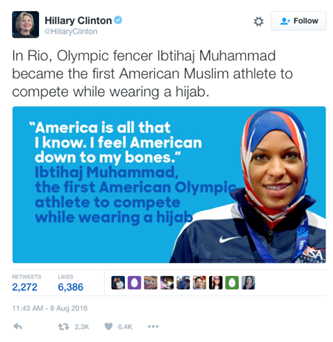
Social media reaction
During a four-month research period conducted by DataEQ, which included the 2016 Olympics and the first three months of 2017, the topic of how people felt about Muslim women wearing a hijab in sports received 233 000 mentions. A large amount of this conversation, over 70%, can be attributed to the announcement made on 7 March by Nike that it will be releasing the Pro Hijab in 2018.
Gender sentiment comparison
As a topic of general conversation, there was a lot of interest from both male and female authors on the topic. Male authors were slightly more negative than female, although both genders showed more positive sentiment overall.
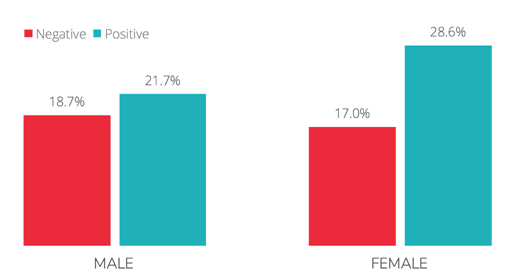 Gender based sentiment comparison looking at women and the wearing of a hijab when playing sport
Gender based sentiment comparison looking at women and the wearing of a hijab when playing sport
Male response
Negative response from men was generally linked to political or broader societal discourses about Islam and wearing of the hijab. This was driven by a large volume of conversation from men in the US, which made up over a quarter of all emotive conversation on the topic.
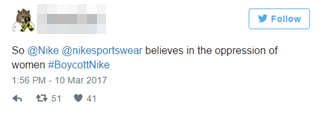
Factors driving positive sentiment included praising Nike for taking an inclusive step by announcing the launch of the hijab as well as expressing how the item will assist Muslim women wanting to participate in sports.
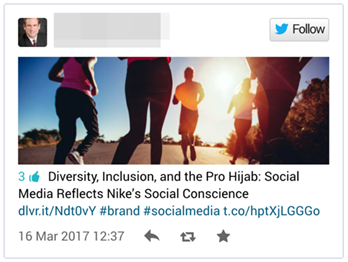
Female response
Both positive and negative conversations were generally linked to discussions around female athletes and the attire they wore while competing. This was well illustrated when FIBA, the official sport’s governing body for basketball, did not allow a player wearing a hijab to compete in a high school game in the US.
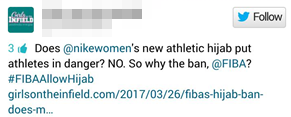
Negative sentiment in regard to Nike was generally focused around the perception that the brand was supporting or profiting from the oppression of women by launching the Pro Hijab.
Location sentiment analysis
A comparison between conversations from the United States, a ‘Western’ country, and the United Arab Emirates, an Islamic country (where the volume of conversation was lower), revealed that the US had a higher degree of negative sentiment towards women and the wearing of the hijab in sports.
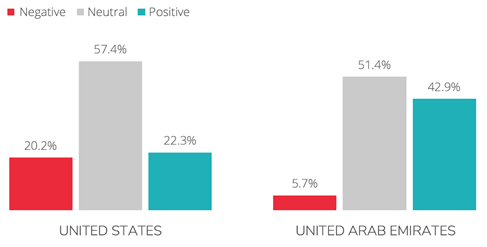 Sentiment data from US & UAE looking at topic of women and the wearing of a hijab when playing sport
Sentiment data from US & UAE looking at topic of women and the wearing of a hijab when playing sport
The hashtag #BoycottNike, was a major contributor to negative sentiment in the US and was mentioned over 4 000 times in conversation.
In the UAE people generally responded positively to the announcement of the Nike Pro Hijab and were in support of women being able to wear a hijab when competing in sports. Brand conversations generally focused on Nike being an inclusive brand that caters to the needs of all athletes.
![]() Tracking sentiment following the launch of the Nike Pro Hijab
Tracking sentiment following the launch of the Nike Pro Hijab
The initial spike in conversation came following the Pro Hijab launch announcement, with 94 384 mentions on 8 March, the day after the official announcement. Positive sentiment spiked on 8 March, with the amount of emotive conversation dropping off within 48 hours of the announcement.
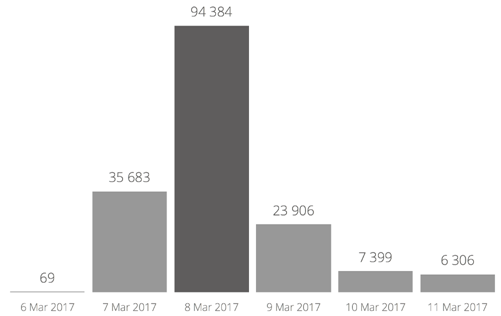 Volume of conversation around the announcement of the Nike Pro Hijab
Volume of conversation around the announcement of the Nike Pro Hijab
Nike Pro Hijab – Brand success story
Following its official announcement on 7 March, Nike has experienced varying sentiment towards the Pro Hijab, but according to social media, people are generally more supportive of the brand. This was revealed by the overall sentiment to the product announcement, which, despite some negativity (13.4%), was generally perceived as a good initiative, with almost double the amount of positive sentiment (26.5%). A large amount of this sentiment was generated from the US, the most active audience. Sentiment towards the Nike Pro Hijab was generally more positive than the sentiment towards the broader social topic of women wearing a hijab while competing in sports.
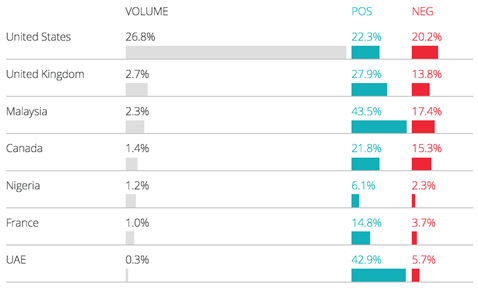 Location sentiment analysis looking at Nike Hijab conversation only
Location sentiment analysis looking at Nike Hijab conversation only
Social media is uniquely positioned to provide insights into how people really feel. Due to the nature of conversations online, people are generally not prompted to provide a specific response to a question, but rather choose to share unsolicited opinions in an open and honest way.
With access to accurate online opinion data, companies can now make informed product innovation decisions based on how consumers really feel.